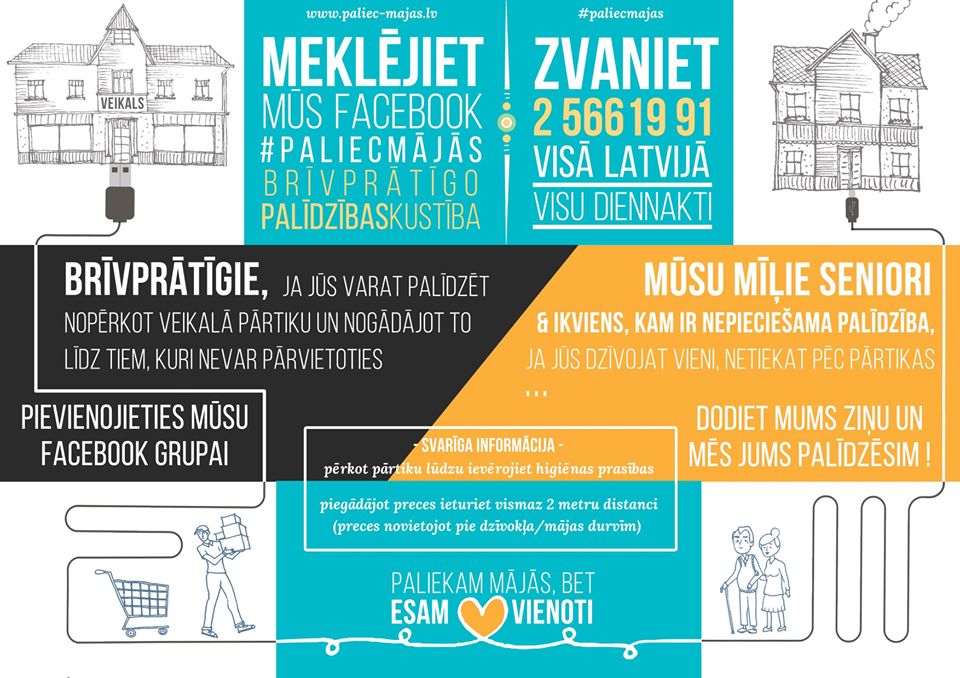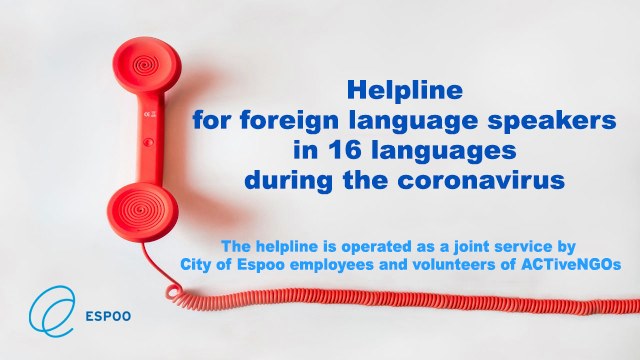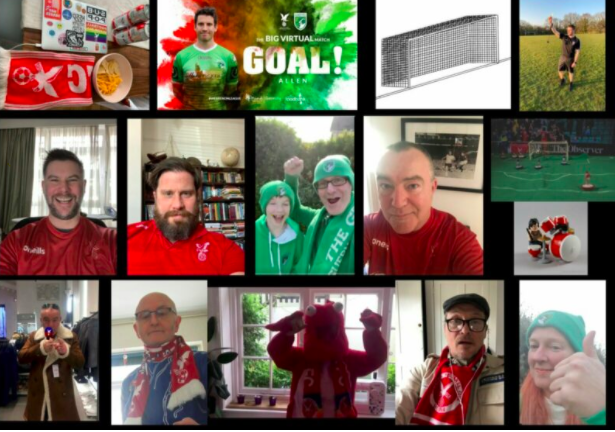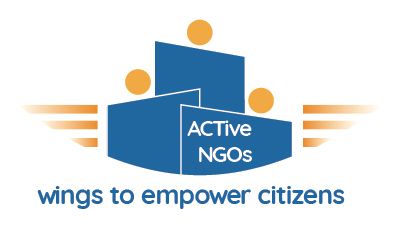Written by Eutropian Director Levente Polyak for Urbact.
The COVID-19 crisis has heavily disrupted the activities of NGO Houses and their civic ecosystems. While the lockdown and rules of social distancing have made most of the activities of these spaces impossible, many NGO Houses moved their activities online and became protagonists in existing or emerging solidarity networks. Existing local communities and solidarity networks proved to be a strong asset in tackling the crisis: in neighbourhoods and cities where mechanisms of solidarity and care had already been in place, NGOs and civic spaces were able to organise themselves and provide their communities with the necessary goods and services. We reached out to partner cities of the ACTive NGOs URBACT network to explore how NGO Houses and their local ecosystems responded to the crisis and complemented the work of municipalities.
More than any other event before, the COVID-19 crisis proved that civil society organisations are key protagonists of our cities. They bring together individuals in neighbourhoods to form groups and engage for the common good. They connect people with similar interests and help them articulate their needs and organise better access to services. They fill the gaps left by the welfare state and help vulnerable groups fight for their rights. In fact, sharing resources and responsibilities between municipalities and civil society actors has helped cities not only in generating enhanced participation in urban development issues but also in co-producing urban space and co-creating urban services. Spaces for NGOs and civic initiatives like the NGO House in Riga are crucial for citizens and civil organisations to meet each other. They act as platforms for public civic cooperation: at the heart of local civil societies, they offer venues for encounters, events and exchange, becoming veritable nodes of their local civic ecosystems.

In Riga, the lockdown put the NGO House, like many similar organisations across Europe, in a peculiar situation. When news of the coronavirus arrived to Riga, most NGOs were busy with compiling their tax report to be filed in every April. As the NGO House was in the middle of the process helping these NGOs overcome bureaucratic procedures, there was no question of suspending these activities. While the municipality the NGO House staff acted quickly to move consultancy activities online and many NGOs followed, not all NGOs could be reached with these webinars. Therefore, the NGO House had to engage in a series of outreach events to get most of its partner organisations on board.
“Participation was very active, but we had to repeat these webinars as we couldn’t reach all NGOs. This created additional work, and people felt lost and tired. So we also started to act on the psychological wellbeing of people working in this field.” Irina Vasiljeva
Digitalisation was not a smooth shift: many organisations were not technology-savvy and were not prepared to engage in online activities. However, with the help of a low-threshold entry to the activities created by the NGO House staff, online events became increasingly populated and, in the end, they attracted more participants than traditional, offline activities. This result prompted the municipality to rethink its outreach strategy and engage in a long-term digitalisation process.
“The biggest issue is not digitalisation itself, it’s rather about the mindset. Both at NGO and Municipality level, we need to figure out what activities can remain online after the lockdown.” Irina Vasiljeva
In the local ecosystem of Riga’s NGO House, many organisations were active in. Inese Vaivare, the chair of the council of the Latvian Civic Alliance and a frequent collaborator of the NGO House, has set in motion the voluntary movement “Stay Home.” Joining a hackathon organised to tackle the Covid-19 crisis with the help of technologies, she became aware of the gap between active technology users and people with less technological skills. Inese became one of the founders of a platform that offers help to anyone who calls the hotline number. Help comes to vulnerable people and isolated groups in form of delivering groceries and other purchases or taking pets for a walk, by over 500 identified and trusted volunteers across Latvia.
In Espoo, digitalisation itself did not bring challenges. The city, as Finland in general, is well equipped with digital tools and methods of communication. The events organised by the municipal offices and their Ngo counterparts were all been moved online, and although these were the first online events in some community members’ lives, the were generally well-received by the public. The municipality also moved many cultural and sports services online, and created an online map of coronavirus-related services provided by non-profit associations.
“Our coordination group is very active, and I am personally very satisfied to see that people were very proactive, proving to adapt very quickly to the shift. It was clear for everyone that we would be doing this together. A very positive sign and an interesting side of the crisis.” Maria Tiilikkala
Similarly to many other cities, local civil society has been active in helping municipal support arriving to vulnerable groups. Existing partnerships between the municipality and civic organisations were very helpful in quickly and efficiently mobilising resources. The NGO EJY Ry joined forces with Nestori, an organisation offering counselling to senior citizens, to launch a helpline and a grocery delivery service with the help of around 100 volunteers. Another food service, targeting low-income and high-risk groups was set up by the food assistance NGO Manna-Apu Ry, together with the Espoo administration.

While the priority of mobilising active citizens was to provide food supply to the elderly and other isolated individuals, the city also had to face another challenge. Espoo, among the cities with the most diverse populations in Northern Europe, has a significant number of large, foreign-speaking communities. While in Sweden, the lack of information in different languages was identified as a key element in a number of deaths, the Espoo municipality and its civic ecosystem made sure that all information is passed to every concerned citizen. On 7 April, an online helpdesk was launched where 25 people were answering the phone in 15 languages, in a joint service by a group of NGOs, handling over 340 calls in the first four weeks of its operation. Besides this service, a smartbot was created to answer questions in more than a hundred languages, serving over 100,000 users.
Santa Pola was particularly impacted by the COVID-19 crisis. With Spain being one of the most affected countries in Europe, municipal institutions, civic initiatives and NGOs have particularly felt the consequences of the sanitary crisis and the lockdown. While the most important community spaces, social centres and cultural venues of the municipality had to close and could not directly reach their communities, NGOs working with vulnerable groups also faced communicational barriers in accessing their beneficiaries. This put in difficulty the whole civic ecosystem of Santa Pola.
“The main community centres of Santa Pola are struggling to shift to online services, as NGOs are all small and are rarely used to working online. Our Youth Centre has been able to connect more, as the media literacy of their community is more advanced. Of course, this shows how we need to invest more on media literacy for everyone.” Marc Bassols
In order to help people deal with isolation, the municipality organised a series of online events, and published a list of useful numbers, helping citizens find NGOs with adequate services that respond to their needs. Other NGOs joined forces to produce cloth masks, while key institutions, like the Civic Center, experimented with moving online some of their training and accompaniment programmes. La Senia established a plan to monitor the health of its elderly visitors. While a big part of the elderly audience of La Senia lacked the necessary digital skills and tools to join online events, the Youth Center found itself in a much better situation to keep in touch with its community, by organising photo challenges as well as live concerts, interviews, debates and even sport activities on various social media platforms.
In Siracusa, influenced by the sanitary crisis in Northern Italy, the lockdown was immediate and very strict. This forced many organisations in the city’s civic scene to adapt their activities and services to the urgent needs generated by the COVID-19 crisis. Learning from its work in co-creating activities with civil society organisations, the municipality invited NGOs to join forces in providing a series of services. These associations, in cooperation with the municipality, have been working on delivering food and vouchers for the homeless and seasonal workers, medicine for elderly and sick people, and distributing tablets for remote education.
In order to help orientation among the various services offered by associations in Siracusa, an online map was created. “Siracusa Solidale,” an online list of solidarity initiatives and organisations collected by the Zuimama Association in the frame of the project “Città Educativa,” includes services like food and medicine delivery, psychological support, counselling and protection against domestic violence. Siracusa Solidale highlighting the importance of building on existing networks and partnerships in times of crisis, making the response to emerging challenges more coordinated, collective and efficient.

Similarly to Siracusa, Brighton and Hove also built on existing networks and partnerships. While the municipality reorganised its priorities in the light of emerging needs, its usual communication and engagement strategies could not reach as many people as normally. Overcoming the digital divide and including those with limited or no access to internet has been a crucial challenge for the municipality. Besides engaging Digital Champions to help citizens familiarise themselves with digital tools and applications, the municipality’s Community Engagement team created social community newsletters for each area of the city, listing key information and services and distributed by volunteers. In the meanwhile, the municipality was struggling with the additional workload and its actions were decelerated by the slowness of bureaucratic procedures.
“I hope this will be the proof of the fact that municipalities need to listen and support more the services that are offered by community centres, acknowledging that they know better what the local needs are.” Thomas Goodridge
Using their agility to react faster and with more freedom to the changing circumstances, civic initiatives, NGOs and community venues in East Brighton were quick to mobilise themselves in helping local communities. Many mutual aid WhatsApp groups were set up to help in the purchase and collection of essential items, and provide social connections for the most isolated people. BELTA, the Bristol Estate Leaseholders & Tenants Association, for instance, has quickly turned its community venue into a food distribution centre, mobilising many volunteers across the city. Venues with gardens experimented with granting individuals and families some time to spend outdoors, in security. Other community venues were converted into 3D printing workshops, or textile studios to produce masks and other safety tools. As a result of these activities, a new generation of volunteers joined ranks with established organisations, younger activists with no previous engagement in community affairs.
In Dubrovnik, the lockdown created a new condition: with the immediate suspension of flights and ferries, the city suddenly found itself without tourists, a rare sight in this heavily touristified city, but with severe economic consequences both for the city’s industries and its civic sector. For Dubrovnik’s NGO Houses and civic ecosystems, the shift from physical to virtual has been fast, and their responses to the COVID-19 situation outperformed the slower and less adaptive reactions of state structures, city departments and public institutions.
“We are seeing an increasing level of awareness regarding the situation, younger activists and volunteers are getting closer to older generations, listening more to their needs and doing their best to look after them. I actually think this played a crucial role in keeping the number of infections so low in the city.” Petra Marcinko
While both the Platform for Lazareti and the Youth Center places had to close with the lockdown regulations, they both managed to reach out quickly to their communities. Every organisation based in the Lazareti complex or in the Youth Centre have mobilised their capacities to provide relief to the community: some organisations 3D-printed protective shields and produced masks, others launched online educational courses and psychology services. The Platform for Lazareti began collecting daily memories and habits of people in its community, and organised an online exhibition displaying these, hoping to connect people and thus contribute to their psychological well-being, making people feel that they are part of a supportive community.

Besides a new sense of solidarity, however, COVID-19 also brought instability to Dubrovnik. As most funding for NGOs in the city are funded through tourism revenues, civil society organisations face severe budget cuts in the coming period. Moreover, funds originating from the European Social Fund, designated to cover operational costs in civic spaces like the Platform for Lazareti and the Youth Center were reallocated for emergency purposes, leaving many spaces across the country in serious financial difficulties. In order to help these community venues overcome the crisis and to better represent them in negotiations with local administrations and the national government about the budget cuts, a national network was formed. Furthermore, all involved organisations are seeking to develop economic models that make these spaces less dependent on public subsidies and help them generate revenues on their own.
“We realized that we need to better communicate with the government, informing them about local needs and issues. We need to educate the public administrations about the importance of our work, the role we play in community building and well-being, so that our activities receive adequate funding. A lot of people remember the war, so they know the importance of services like ours, as in times of emergency the state didn’t have the means and the time to follow local communities and especially disadvantaged groups.” Petra Marcinko
These stories collected from the cities participating in the ACTive NGOs network indicate an important tendency: NGO Houses across Europe have been key collaborators of municipalities in tackling the COVID-19 crisis. Community venues and the civic networks organised around them have been an important resource for cities in reaching out to local communities and civic initiatives. There are many reasons why local and national funding should give priority to developing and nurturing local civic ecosystems. Because of their direct connection to local communities, NGO Houses and their civic partners know better their needs, vulnerabilities and strengths. Through these (often personal) connections and trust, local civic networks are often better positioned to mobilise people, communities and capacities such as volunteering, mutual care and distribution of goods of primary necessity. In an ecosystem based on the cooperation of many organisations, it is easier to identify the skills and resources available in the community, and activating them to address pressing challenges. The position of many NGO Houses and their partner organisations at the margins or outside of public bureaucracy makes them more flexible and faster in reacting to emergency situations. They also accommodate citizens and groups with a desire and capacity for long-term engagement, going beyond the duration of political cycles and public commissions.
Municipalities have a key role in these ecosystems. By creating an overview of the local civic networks, municipal officers can understand better the role of each organisation and help them coordinate their activities. By mobilising funding and channelling resources into civic ecosystems, public institutions can improve cooperation among local stakeholders. By developing governance models and protocols for the shared management of resources, municipalities can share responsibilities and help their partner organisations grow and reach maturity. By providing spaces for civic initiatives, authorities they can help these initiatives gain new skills and new capacities, contributing to their stability.
In this context, especially with the perspective of new austerity measures and reduced public budgets for social and cultural activities, stronger cooperation between public authorities and civil societies are needed. To support the social cohesion in local communities and keep NGOs active, it is important to help community venues and their civic partners overcome physical distances by supporting the digitalisation of some of their activities. New digital tools, platforms and educational methods are needed to improve digital literacy and create a shared digital culture. New outreach actions are necessary to overcome the digital gap and include marginal groups and isolated individuals. New funding programmes are vital in helping NGOs and NGO Houses overcome their budget shortcomings. It is essential that new legal frameworks enable civic organisations to develop economic models that make them more economically independent, opening new revenues streams and creating stronger links between NGOs and social economy initiatives. These measures can all contribute to increasing the stability of NGO Houses in the post-COVID period: a crucial component of more resilient local societies.


